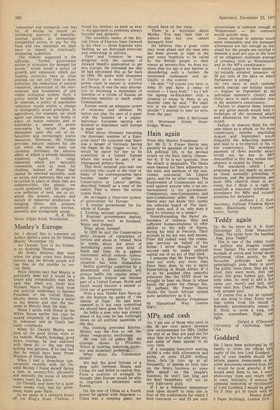Mosley's Europe
Sir: I should like to comment on Arthur Butler's piece on Sir Oswald Mosley (November 13).
Sir Oswald, Tom to his friends, is no doubting Thomas.
Be firmly believes that soon when the great crisis hots Britain
history and the British people will tap him on the soulder to rescue them.
Peter Jenkins says that Mosley is politically dead but it would be a brave and irresponsible man who said that when you recall how Richard Nixon fought back from the political wilderness to become President of the United States. Mosley shares with Nixon a belief in his destiny and that the moment in History finds the man. When I spoke with Nixon in the White House earlier this year he waxed eloquently of how Churchill, Adenauer and de Gualle had made comebacks.
When Sir Oswald Mosley was born all the good fairies were at his bedside. Wealth, breeding, good looks, courage, he was endowed with them all — the one thing lacking was patience. If he had had that he would have been Prime Minister of Great Britain.
When I had a three-hour conversation recently with Sir Oswald Mosley I found myself facing a man, at seventy-five, physically and mentally the equal of anyone twenty years his junior. Sir Oswald, over here for a quiet three weeks visit, has his permanent home near Paris.
As we spoke in a terraced house off the King's Road, Chelsea, I found his intellect as keen as ever — his approach to problems always forceful and dynamic.
The erstwhile leader of the British Union of Fascists leant forward in his chair — those hypnotic eyes flashing as we discussed everyone and everything in politics.
First and foremost he was delighted with the success of Edward Heath's application to get into Europe. He reminded me that he had advocated this as far back as 194b. He spoke with eloquence of Europe as a nation, a third power equal in stature to America and Russia. It was the only alternative to becoming a dependant of America or a victim of Russia; an American satellite or death under Communism.
Europe needs an adequate power of economy and defence. No nation can play the part of a giant with the muscles of a pigmy. Individual European nations are doomed to impotence until Europe is made one.
What about Germany becoming the dominant member of a European state? He conceded that there was a danger of Germany having the finger on the trigger — but it would be easier for her to be controlled in a United Europe where she would be part of an interegated defence force.
This most talented post-war one politician who could in the view of many of his contemporaries have become leader of either the Conservative or Labour parties, described himself as a man of the centre. That is where the action comes from.
He envisages a three-tier system of government for Europe: 1. A central government for the whole of Europe.
2. Existing national governments. 3. Regional governments dealing with nations such as Scotland, Wales and Ireland.
What about Ireland?
In 1920 he quit the Conservative party because of complaints of torture and abuse in Ireland. Now he warns about the error of introducing some new kind of Black and Tans. He is against internment which reduces habeas corpus to a sham. The Ulster situation has been mishandled. "Skilful guerrillas supported by a determined civil population will always baffle the regular army." He believes Ireland can become part of a United Europe. North and South would become a second or third tier of government.
With a new Middle East flare-up on the horizon he spoke of "the inanity of Suez." He had been opposed to it but once committed we should have gone the full road. As befits a man who was always ahead of his time he has forthright views on all political questions of the day.
His thinking preceded Keynes. Mosley was the first to use the phrae wage-price mechanism.' He was full of praise for the courage shown by President Nixon in tackling American economic and monetary probelms.
What about the Communist threat?
We had the good fortune of a deep split between Russia and China; we had failed to exploit this. From a position of strength he thought that Europe would be able to negotiate a settlement with Russia.
On the role of China as a fourth power he agreed with Napoleon — China was a sleeping giant; we should have let her sleep.
There is a mystique about Mosley. You may hate him or admire him but you cannot disregard him!
He believes that a great crisis may loom ahead and the man who has been proven so right in the past waits hopefully to be called by the British people to their rescue at seventy-five, he does not think that his age is any barrier to shouldering such a burden. He mentioned Andenauer and deGaulle, in this context.
He said, "Of course you have to keep fit and have a sense of mission — I have both." " As I left the ageing ex-Blackshirt with a promise to recap in Paris in six months' time he said, "We shall win or we shall return upon our shields." I seemed to hear an echo from the past.
John S. McCowan
115 Worcester Street, Stourbridge, Worcs.










































 Previous page
Previous page